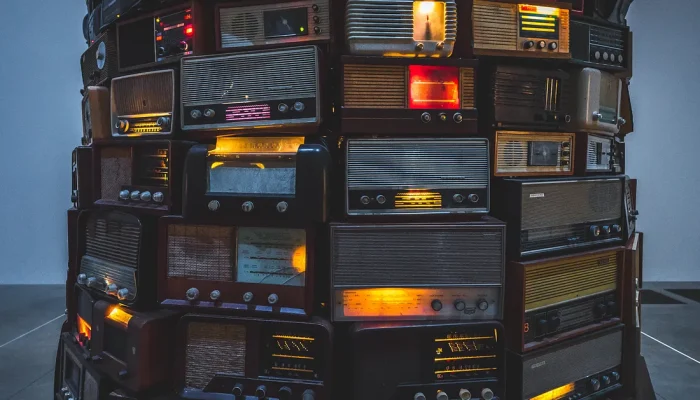In our last post, we talked about the significant overlap between live radio and Clubhouse.
Many of our team members have considerable experience in live radio. As we internally discussed approaches to Clubhouse, we thought it would be valuable to a lot of people exploring and experimenting with Clubhouse to know how top radio producers think about creating live audio shows. Over the next several posts, we are going to share the accumulated wisdom of some very smart people with deep experience and expertise in live audio production.
- Part 1 (this post) is going to focus on pre-show preparation.
- Part 2 details the qualities of a great host (moderator in Clubhouse terminology) and the role of a live audio show producer (also a moderator in Clubhouse).
- Part 3 will focus on question lines and strategies and how to prepare your guests before the show.
- Part 4 deals with managing issues during the live show itself, from bad guests to resetting the room.
How does a live audio show think about topic selection? What makes for a great topic? What makes for a bad topic?
A good topic tells the listener something they don’t already know, either new information or a new perspective. A good topic can also provide a space for people to discuss and debate a timely issue, especially on an interactive platform like Clubhouse or a call-in/text-in live radio show. But most importantly, the topic must have a “hook”, a reason why we’re talking about this subject right now. There may not be bad topics. There’s probably a keen audience for almost any topic out there. But even a good topic can be executed badly. And, when it comes to audio, bad execution is one that lacks focus, story and/or compelling guests.
— Liz Hames, Showrunner
The best thing about live audio is how up to the second it can be. While it may give the content a short shelf life, the energy from being “on” the issue at hand is attractive. So your topics should connect as best they can to very current issues — something that happened today, or this week, or is about to happen this weekend, etc. That’s a good topic.
A *great* topic shapes that approach into a clear point of view that only your show can offer. Whether it’s in your host’s knowledge or personality (and that of your guests), you should have something to say, or a curiosity unique to your show, that makes the topic a big winner for your audience.
— Dominic Girard, Showrunner
A great topic has depth. It invites people from a variety of cultures, experiences, races etc. to find a connection point and offer different, possibly clashing, ideally new perspectives. I think a good topic also invites people to get personal and tell stories. Purely informational topics may be better suited to other mediums. Live radio and Clubhouse are not the places for a lecture. The responsiveness of live radio is one of the things that make it special. There’s also an art to striking the balance, over the course of a show, or in a clubhouse room, so that there’s relief contrasted with heavier, emotional topics. There’s also a different comfort level for everyone when you don’t have to be on camera.
— Tori Allen, Showrunner

Radio has a nickname: “the immediate medium.” Compared to broadcast TV news (which requires pictures), or print journalism (which used to require printing presses and physical distribution), radio can respond to live, quickly changing events much faster. Great radio plays to this strength. So too can Clubhouse.
— Dan Misener, Director of Audience Development
When thinking about guests to appear on your live audio show, what qualities and/or criteria do you look for?
Would you invite your guests to a dinner party? That’s a good place to start. You want the storytellers. People who you want to spend time with. People who believe in what they do, and want to share their passion. People who like to laugh and don’t take themselves too seriously. People who are smarter than you. A good interviewer will create a delightful conversation with someone like this. They will listen, respond, and guide the conversation to unexpected places.
— Erin Pettit, Show Runner

Think about the format. Is this a panel? Are guests going to be interviewed in succession? How do they play off or build on each other and relate to each other?
— Tori Allen, Show Runner
Great guests deliver what audio is best at: action and emotion. Look for guests who “talk in stories.”
— Dan Misener, Director of Audience Development

Think about the mix of guests not just for the information they bring with the words they will be saying, but also about all the information they bring with their voices. In an audio-first medium, voices are an incredibly powerful conduit of understanding about your guests’ perspectives, experience, cultural background, and all sorts of elements of who they are beyond the title you might use in their intros. If all your guests are from only one demographic, the audio experience for your audience will be as one-note as if you lined up a panel of people who all agreed on the central issue for debate. Reflecting the real diversity of the audience you want, in the guests you chose, is a surefire way to amplify your values of inclusion and equity. On top of that, it will always, always, always, make for a better, richer listening experience as well.
— Karen Burgess, Executive in Charge of People & Development
Like any good audio story — even a live conversation needs characters. Is your guest engaging? Charismatic? Highly opinionated? A button pusher? A gasbag? Do they have something to say about the topic? If you are producing a panel conversation, does every guest have a different POV? Good guests know how to play off each other, and have something of substance to say about the topic at hand. Great guests have all of that plus a personal stake in the subject matter and can bring emotion and lived experience to the table. Find great guests.
— Dominic Girard, Show Runner
What kind of research do you do on potential guests in advance of a live audio show?
As much as you can. First things first: are they a good talker? What’s their expertise or POV? Read everything you can that they’ve written about the subject at hand, and read or watch other interviews they’ve given or panels they’ve been on. Find out as much as you can about what they’ve already spoken about so you can get them to tell you something they haven’t said a million times before.
— Alison Broverman, Showrunner
Check out their Twitter feed. See what they’re thinking about today. It’s a great way to engage someone. Try to link what they’re talking about now to their expertise or research.
— Erin Pettit, Show Runner
Talk to them. Don’t do a full interview, but get them on the phone (or Zoom, or whatever) and probe what they’d have to offer. If they’re a recurring guest, check-in with them and help them prep for the next segment.
— Dominic Girard, Show Runner
Don’t let a pre-interview spoil the actual guest appearance. Prep is important, but it’s easy to overdo. You can’t fake genuine curiosity, surprise, or delight. Create space for spontaneity.
— Dan Misener, Director of Audience Development
Find out where their boundaries are. You don’t want to push a guest to talk about something live that doesn’t feel safe or comfortable unless it’s an accountability interview. Communicate those boundaries to your host. Also, ask guests how they would like to be introduced, how to pronounce names, and which pronouns they prefer. It’s easy to make assumptions about all of those things and it can really set a bad tone if you or your host gets it wrong.
— Tori Allen, Show Runner
The other pieces in this Clubhouse series are:
- Part two shares the qualities that make for a great live audio show host. Plus, why you need a producer and what they should do before and during a live show.
- Part 3 explores question lines and strategies and how to prepare your guests before the show.
- Part 4 deals with managing issues during the live show itself, from bad guests to resetting the room.
Sign up for the Pacific Content Newsletter: audio strategy, analysis, and insight in your inbox.





